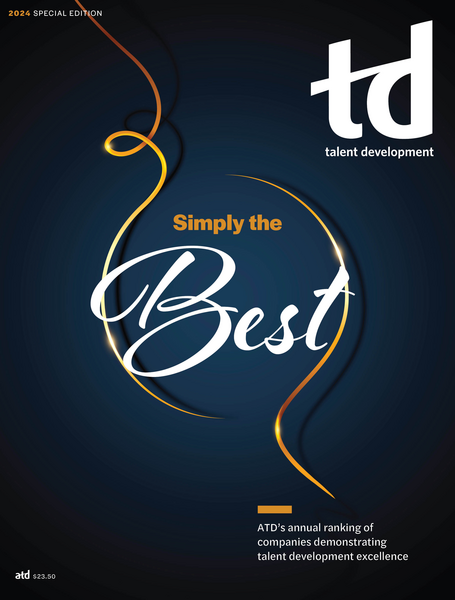TD Magazine Article
Member Benefit
Winning the Technology Race
Organizations are setting the pace for improving staff’s digital competency and artificial intelligence literacy.
Fri Jun 14 2024

The BEST Awards recognize organizations that demonstrate enterprise-wide success as a result of employee talent development. The winners use learning as a strategic business tool to get results. View the entire list of 2024 BEST Award winners.
Organizations are setting the pace for improving staff's digital competency and artificial intelligence literacy.
As digital technologies and artificial intelligence programs progress at a breakneck speed, six BEST winners are using workforce training to capitalize on those advancements, driving innovation and meeting ever-growing business and client demands.
Consider Zoetis China. Its innovative talent development initiatives reflect the company's commitment to staying at the forefront of animal healthcare industry trends and fostering a culture of continuous learning. In a proactive move to enhance the digital skills of its people leaders, the organization introduced a blended learning TD strategy during the past year. The initiative, designed to keep pace with the fast-moving digital landscape and the increasing importance of e-commerce, combines on-site training, visits to business giants, and collaboration with industry leaders.
"We recognized the significance of e-commerce in the contemporary business landscape and understood the need to equip our people-lead managers with the knowledge and skills required to navigate this digital realm effectively," says Eric Zhu, Greater China L&D lead.
Chegg, a global education technology company with 2,000 employees, also recognizes the importance of AI upskilling and reskilling for its workforce—calling it not just important, but "essential" to the business. According to Lora Kyle, vice president of TD, "AI plays a pivotal role in our company's strategic objectives from our Chegg Study product line to our Chegg Skills courses."
Besides integrating AI into its products, Chegg also offers employees the opportunity to learn more about AI concepts. Company leaders believe that investing in AI upskilling and reskilling equips the workforce with the necessary skills and knowledge to effectively adapt to technological advancements.
To stay competitive and at the forefront of technological innovation, Power Grid Corporation of India Limited, one of India's leading power transmission companies, is making significant investments in developing in-house expertise in AI, machine learning, and data science. "The organization needed to adopt world-class technologies and make the workforce future-ready with high digital competencies," says Yatindra Dwivedi, director of HR. "During brainstorming sessions with senior management, it was agreed that artificial intelligence and machine learning are becoming increasingly important."
Course design
With the launch of its Digital Hunters development program, Allianz Turkey is improving employees' digital literacy skills and driving the global insurance company's digitalization processes. The program's design focuses on seven areas the company identified through extensive needs analysis, including workshops, surveys, and proficiency assessments.
"Recognizing both the need for development across our organization and the technical nature of topics related to technology and digitalization, we were driven towards employing multiple learning methodologies," explains Ilkay Ozel, chief people and culture officer at Allianz Turkey. Those methods include in-person and digital training programs, digital coaching workshops, gamification through knowledge test "duels," lunch & learns with field experts, and a seminar series featuring external experts.
At other companies, flexible learning options figured into program designs. For instance, Chegg's TD team implemented a combination of skills courses and self-paced learning modules to accommodate various learning preferences and schedules. The Chegg Skills program focuses on helping professionals learn how to prompt, apply, and use AI responsibly on the job. "By focusing on skills acquisition through intensive, hands-on experience; fostering collaboration; and providing immediate feedback," Kyle explains, "we aim to cultivate a dynamic environment where innovation thrives and individuals flourish, driving sustainable growth and meaningful impact in all our endeavors."
As clients of EPAM Systems, a software engineering services firm, expressed increasing interest in various facets of AI, the company made a strategic decision to invest in comprehensive AI training for its employees. To equip the workforce with in-depth knowledge of generative AI, EPAM says it offers comprehensive training materials, conducts cutting-edge research, and provides tailored solutions to meet diverse needs.
The company focuses primarily on self-paced courses, enabling employees to progress through the material at their own speed. "By offering courses in this format, we empower individuals to take ownership of their learning journey, enabling them to balance professional responsibilities with skill development in AI," explains Ina Novikava, head of L&D. Additionally, EPAM uses AI technology to evaluate practical tasks within the courses, eliminating the need for human involvement in the assessment process.
For other organizations, however, human interaction and expert partnerships helped realize significant program benefits. Zoetis China's training program, for example, covers a wide range of e-commerce topics, including market trends, consumer behavior, digital marketing, and e-commerce platforms. To complement classroom learning, the company organized visits to a top e-commerce company, where participants witnessed firsthand how leading companies in the e-commerce space operate from strategy development to execution. The opportunity "was instrumental in bridging the gap between theory and practice," states Joanna Jiang, an L&D manager.
Further, Zoetis China invited experts from Microsoft to provide an in-depth analysis of the latest digital solutions and technologies, helping the TD program "stay in sync with the most cutting-edge technology trends in the industry," says Frank Feng, an L&D manager. Program leaders encouraged participants to form study groups to strengthen their learning and discuss new ideas to integrate practices into their daily roles.
Meanwhile, Power Grid partnered with the International Institute of Information Technology, Bangalore, to design and deliver a customized 15-month postgraduate diploma program. The utility seeks to train 50 executives each year with the goal of transforming at least 2 percent of its 8,300-person workforce into AI and machine learning experts.
At WNS, its AI Council—which comprises leaders from analytics, business transformation, and technology functions—has been influential in helping the business process management company upskill its more than 60,000 employees on AI capabilities.
"The AI Council works closely with various business units across WNS to determine key priorities, focus, and scope of leading the organization into the era of" AI- and generative-AI-led innovation, says Rajnish Borah, global head of learning, organization effectiveness, and diversity, equity, and inclusion. "With the TD team, the AI Council has played a crucial role in creating a robust AI capability framework, reviewing program curricula, ensuring a holistic focus on learning experience, and providing thought leadership to various learning initiatives."
Clearing hurdles
Several award winners describe the challenge of developing and implementing AI training while simultaneously keeping pace with the rapidly evolving nature of the technology. Moreover, EPAM notes ethical and societal implications of AI training to consider.
"This includes ensuring that training materials and methodologies are aligned with ethical principles and values as well as addressing concerns related to bias, fairness, transparency, and accountability in AI systems," says Novikava.
Allianz Turkey's CEO and senior management regard "education as the cornerstone of sustainable success," says Ozel. Because of that support, the TD team is building "a culture of sustainable learning" and has established a governance model and program design process to achieve that goal. When the team noticed "reluctance and apprehension" from employees about improving their digital literacy, Ozel notes, it developed engaging communication strategies and collaborated with a technical university to design the program as a certification process.
Beyond the challenge of ensuring the training program's algorithms, hardware, and software worked together seamlessly, Power Grid's TD function also faced resistance to change from staff. To address the hurdles, the team implemented a change management process in addition to communicating the benefits of the project to stakeholders and addressing their concerns. The company also gives participants 15 days off to work exclusively on their project.
WNS faced two significant challenges when developing its program. The first was defining participant curriculum fit. "We solved this conundrum by creating categories such as 'users of AI,' 'adopters of AI,' and 'creators of AI.' Our program addresses the specific needs of these categories," Borah shares.
Another challenge was identifying the right academic partners. Borah states that after many rounds of conversations with multiple institutions worldwide, WNS partnered with Carnegie Mellon University's Tepper School of Business, KPMG, LinkedIn, Google, and a consulting firm to educate the entire workforce.
Measurable results
EPAM has already seen demonstrable results from its AI training program. "We started measuring \[participants' improvement\] through various metrics, such as performance on assessments (by adding AI as obligatory skills for some roles and levels), completion rates of courses, and feedback from participants and their managers," Novikava reveals.
Despite the complicated nature of implementation, Chegg has successfully tailored content, measuring the effectiveness of training programs and fostering a culture of continuous learning. "We're particularly proud of the tangible impact our AI training program has had on our employees," Kyle explains. "Observing team members adeptly apply AI concepts to address intricate challenges and propel impactful business outcomes is undeniably gratifying and a testament to our collective dedication to excellence."
The results at Allianz Turkey speak for themselves: a 70 percent participation rate, a program satisfaction score of 4.5 out of 5, and a program recommendation score of 70 percent. "Furthermore, all these results have shown us that we have overcome the reluctance towards digitalization by this program," Ozel says.
That success has led to increased awareness and interest in digitalization within the organization, resulting in an expansion of technology usage across all functions, a rise in digitalization-focused projects, and a spin-off program concentrated on financial literacy.
Through Power Grid's training program, participants developed AI-powered applications such as Prabha, an HR chatbot; AMRIT, an asset management system; and an AI-based tool for identifying defects in transmission line towers.
"One of the primary benefits of competency/skill programs is improved performance of employees," says Dwivedi, the HR director. "This has been measured through metrics such as increased accuracy in prediction models, reduced errors in data processing, and improved efficiency in completing tasks."
Aside from its partnerships, WNS has achieved more than 50,000 learner footfalls in robotic process automation, digital awareness, AI, and generative AI; more than 300 capstone ideas; more than 20,000 learning badges; 16,000 LinkedIn certifications; and more than 30,000 learning footfalls for AI-based learning programs during the past five years.
"WNS takes pride in its domain expertise and its bent to drive gains for clients" through AI, analytics, and technology-led innovations, concludes Borah, the company's global head of learning.

